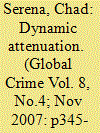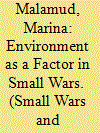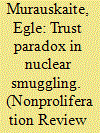| Srl | Item |
| 1 |
ID:
080439


|
|
|
|
|
| Publication |
2007.
|
| Summary/Abstract |
This article analyses the ability of the US Army Special Forces to combat illicit networks (criminal and terrorist) through 'dynamic attenuation'. It is argued that a process of dynamic attenuation, where network ties and not the actors in the network are targeted, should replace the current US strategy of 'killing or capturing' criminal agents threatening US interests. By dynamically attenuating (not destroying) the ties between and among criminal actors and criminal organisations, the US can effectively reduce the capability of criminal organisations to operate and achieve their missions (profit and/or terror). This argument is substantiated by assessing the environments where criminal networks thrive, the characteristics of criminal networks, the utility of targeting networks instead of individual actors, and through a comparison of criminal organisations' and US Army Special Forces' strengths and weaknesses. This article concludes with implications and recommendations for US policy in the fight against criminal organisations
|
|
|
|
|
|
|
|
|
|
|
|
|
|
|
|
| 2 |
ID:
158976


|
|
|
|
|
| Summary/Abstract |
This research paper analyzes the relationship between small wars, insurgency, and the natural environment. Existing literature and data are organized into four behavioral patterns: the resource-based wars accounts for the fight over natural resources; the warfare ecology paradigm refers to non-premeditated damage in preparation for as well as during and after conflicts; the environment as a target discusses intended attacks on the ecosystem; and the insurgency–climate intersection pattern denotes a deviation in climate change that increases the frequency of intergroup violence. The main premise is that small wars emerge when the ecosystem becomes a political asset.
|
|
|
|
|
|
|
|
|
|
|
|
|
|
|
|
| 3 |
ID:
164408


|
|
|
|
|
| Summary/Abstract |
Third countries’ are frequently exploited by those involved in networks to transfer proliferation-sensitive technologies, allowing procurement agents to obscure the end user or vendor located in the proliferating state, and to deceive industry, export licensing officials, and intelligence services. While ‘third countries’ frequently feature in illicit transactions, the academic literature exploring the roles played by entities in these jurisdictions is limited. Building on the sanctions busting literature, this article proposes a loose typology considering the ways in which third countries can be exploited by proliferation networks. The typology is illustrated using three cases involving entities based in Malaysia – A. Q. Khan’s nuclear black market network, and Iran and North Korea’s efforts to procure and market WMD-related and military goods. These cases are used to generate insights into proliferators’ selection of ‘third country’ hubs. The article argues that while exploitation of third countries by proliferation networks is a similar, but distinct phenomenon to trade-based sanctions busting, hubs of both activities share characteristics. Furthermore, the article argues that other factors beyond the lax regulatory environment, such as level of development, and personal connections, are often as important in driving the decisions of proliferation networks. The article concludes with implications for nonproliferation policy.
|
|
|
|
|
|
|
|
|
|
|
|
|
|
|
|
| 4 |
ID:
144285


|
|
|
|
|
| Summary/Abstract |
This article explores the paradox of trust in the largest nuclear smuggling operation involving highly enriched uranium (HEU) discussed in open source literature. In the first effort to understand the type, extent, and role of trust in nuclear smuggling enterprises, it draws from literature on trust development in legitimate businesses as well as criminal enterprises. Observed behavioral patterns in this case challenge traditional notions of the internal dynamics of temporary groups engaged in nuclear smuggling and operational realities of such activities. The article seeks to explain why individuals agree (and continue) to operate in this high-risk environment, unbound by close personal ties, without any effort to verify the background, motives, or qualifications of the fellow conspirators. It offers ways to advance current nonproliferation efforts in non-state actor interdiction by exploiting the environment of shallow trust in temporary groups.
|
|
|
|
|
|
|
|
|
|
|
|
|
|
|
|